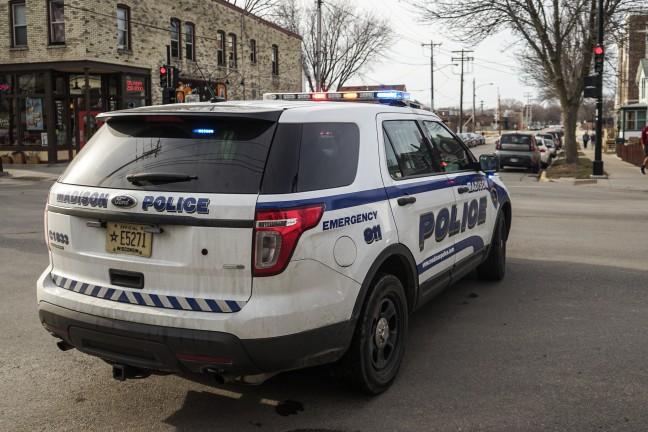Madison mayoral candidate Gloria Reyes is proposing bringing police officers back into schools as part of her election bid. After supporting an effort to remove officers from schools during the pandemic, she suggests that this is now a good time to reevaluate the issue. Should police officers serve in schools?
Point: Police officers do not belong in schools
The inception of policing in schools came about in 1948 with the Los Angeles School Police Department, an initiative aimed at patrolling recently integrated schools, according to the ACLU. At that time, the reigning belief was that allowing Black students into previously all-white schools would be accompanied by an increase in violence.
The blatant criminalization of Black students that prompted school policing decades ago is a sentiment that persists today. Roughly 47% of public schools in the nation have security staff present at least once per week, with a higher concentration of on-campus law enforcement officers in schools with more students of color.
The American education system has already failed its students in a didactic sense with whitewashed U.S. history curricula that fail to wholly address the nation’s deep-rooted racism. This complacency, coupled with law enforcement presence in schools, perpetuates the oppression and harm that come hand-in-hand with policing.
The guise of safety and protection that is offered by police presence in schools is an insidious force that is made more powerful by the unwillingness to confront the vicious realities of our national history.
Children are socialized to accept pro-police sentiments as inarguable and objective when presented with law-enforcement-headed programming such as “Officer Friendly” and D.A.R.E. These programs herald police officers as trustworthy, positive figures while bypassing the opportunity to educate students about the dangers of police brutality.
Black students are disproportionately harmed by policing. A 2018 report from the ACLU revealed Black students lost 66 days of school per 100 students due to suspensions compared to just 14 days for white students. The implicit biases in disciplinary measures enacted by school personnel target students of color and contribute to the school-to-prison pipeline.
Police surveillance in schools yields higher volumes of disorderly conduct charges. According to the New York Times, however, these charges often consist of arrests based on trivial offenses such as turning off the lights in the girl’s bathroom or violating the dress codes. These instances do not necessitate the invocation of police power.
School policing inherently perpetuates racism in its operations by punishing perceived deviance, which cultivates a more dangerous environment for students of color. And support services to address this hostility are limited. According to a study conducted by the ACLU, 14 million students go to schools with police officers but without crucial counseling staff.
If prioritizing the safety of students in public schools is truly the objective at hand, then defunding the police, reallocating funds to mental health services and implementing transformative justice initiatives would be a more effective way to achieve it.
Katie Sullivan (kbsullivan2@wisc.edu) is a sophomore studying health promotion & health equity and communication sciences & disorders.
Counterpoint: The role of police in schools should be reevaluated
It is no surprise that in recent years there has been both hesitation and movements against policing institutions around the country.
In a Gallup poll that was conducted in the weeks following George Floyd’s death, Black respondents’ confidence in the police was at a low of 19%, and 56% among white respondents. In 2021, however, the confidence in the police rose to 27% among Black respondents and remained 56% among white respondents.
Though confidence levels have risen since 2020, most recent data shows they remain low in 2021. This begs the question of whether police officers in schools would be beneficial.
The creation of the police in the United States rests on the moral ideology that the police are meant to protect and serve the individual and thus the American people.
All institutions are susceptible to corruption and policing institutions are no exception. Police departments around the United States may very well have been corrupted by unconscionable or explicit racism. But, just because something has been cracked, doesn’t mean it’s broken.
Here lies an opportunity to repair the trust that has been broken among large demographics of the American public. With other reforms and bias training, police in schools could reinforce a positive relationships among students. If policing can be adjusted to support the community’s needs, the relationship between police and civilians could fundamentally improve.
Building healthy, genuine relationships with students outside of a criminal context could transform young people’s understanding of law enforcement. In turn, students could trust policing institutions to protect them from harm, not cause it.
Additionally, after many treacherous school shootings in the past few years, many have argued to arm teachers in school as an answer. According to the Washington Post, however, researchers have found no evidence that arming teachers, among other security measures, has any effect on school shootings.
One of the arguments supporting this idea is that even a highly trained teacher with firearms would be unable to respond as quickly or effectively as a member of law enforcement. So if arming teachers is not the answer and law enforcement is much more effective at protecting students, then maybe the answer lies in reconsidering the role of police officers in schools.
If police are allowed to serve in schools, they have the potential to restore the trust they have lost and return to their intended moral role in society. They could rebuild relationships in their communities, giving young people the confidence they need to believe the police can be a positive force in their lives.
Jessica Lewin (jrlewin2@wisc.edu) is a junior studying journalism and philosophy.


